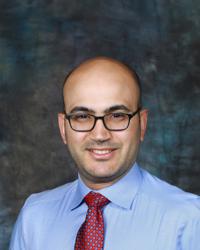UnityPoint Health - Grinnell General Surgery and Weight Loss Surgery Clinic

Information
Number of patients waiting reflects the current number of patients waiting to be seen. This number changes frequently and is not exact.
Hours and Directions
Hours of Operation
- Monday: 7:30 AM - 4:30 PM
- Tuesday: 7:30 AM - 4:30 PM
- Wednesday: 7:30 AM - 4:30 PM
- Thursday: 7:30 AM - 4:30 PM
- Friday: 7:30 AM - 11:30 AM
- Saturday: Closed
- Sunday: Closed
Surgical Care Close to Home
We are proud to offer a full spectrum of care at the Warren H. Bower surgical center, providing our patients access to traditional and specialty surgical services including bariatrics, breast, ENT, general, gynecology, orthopedics, podiatry, thoracic, trauma and urology.
We pride ourselves on having a highly-qualified surgical nursing staff. Surgical services staff in the operating room, central supply center, outpatient and recovery room have earned advanced certifications and have years of professional experience.
General Surgery
Our general surgeons in Grinnell are experts in treating a wide range of conditions using minimally invasive surgical techniques whenever possible. Whether you're facing a hernia, need a colonoscopy, gallbladder removal or appendectomy, our team has the skills and experience to help you every step of the way. Talk to your primary care provider about a referral to the General Surgery and Weight Loss Surgery Clinic or call us to learn more.
Bariatric (Weight Loss) Surgery
Our weight loss surgery program offers a supportive and personalized approach. We use the latest techniques and hold national accreditations for our quality care. Get started on a stronger and healthier you. To learn more about types of bariatric surgery procedures, preparing for surgery and frequently asked questions, read more about bariatric surgery below, call us or fill out our contact form online.
Breast Cancer Surgery
Our experienced breast surgeon offers a range of services for breast infections, cancer diagnosis or treatment including, but not limited to:
- Lumpectomies (removing a lump)
- Breast biopsies (tissue samples)
- Mastectomies (full or partial breast removal)
We understand that a surgical procedure or breast cancer diagnosis is a challenging and emotional journey. Our team is dedicated to working closely with local specialists to create a personalized treatment plan aligned with your needs and goals to ensure you feel empowered, supported and in control.
Discuss your breast health with your primary care provider or call us for more information.
Our High-Quality Care Accreditations & Recognition
Starting with your first appointment, we care for you as a person, not a number. Our care team is staffed by qualified professionals who truly care about your journey and are devoted to helping you reach your goals. Our commitment to high-quality care shows in the distinctions we've received. These include:
- National Surgical Quality Improvement Program (NSQIP). This designation reflects our proven record of adhering to the most rigorous standards in surgical quality—to minimize complications, improve outcomes and save lives. When you see the ACS Surgical Quality Partner mark at GRMC, you can trust that we’re dedicated to quality and relentless self-improvement.
- Metabolic and Bariatric Surgery Accreditation and Quality Improvement Program (MBSAQIP) Bariatric Comprehensive Center. We've received this designation since 2006 and are one of only a few rural hospitals with the distinction of MBSAQIP. This demonstrates the high quality of our hospital, staff and procedures.
- Wellmark Blue Cross® and Blue Shield® with a Blue Distinction® Center+ for Bariatric Surgery. This designation means we have good outcomes for overall patient safety and bariatric procedures.
Our Providers

Anna Mensing, MD
Breast Surgery, General Surgery

Lynn Moorman, ARNP
Bariatric Medicine

Brittney Jansen, MSN, ARNP, FNP-C
Bariatric Medicine

Phillip Bilderback, MD
Bariatric Medicine, Bariatric Surgery, General Surgery

Jarrod Phelps, PA-C
General Surgery

Mahmoud Tayash, MD
Bariatric Medicine, General Surgery, Bariatric Surgery
Bariatric (Weight Loss) Surgery in Grinnell
Weight loss surgery can be an important part of changes that can improve your lifelong health. Weight loss surgery may be an option when diet, medications and medical weight loss have failed. Bariatric surgery makes your stomach smaller by reshaping it. When you have your bariatric surgery procedure at UnityPoint Health – Grinnell, you'll find a care team that is familiar with every aspect of your treatment.
Get Started
Get started by watching our free, online seminar, then filling out our bariatric interest form online. Our team will review and determine if you are a good candidate for surgery and contact you with next steps.

Why Choose Us?
- Bariatric Center of Excellence: If you're considering surgical weight loss, you're probably learning that there are many steps you need to take to prepare for bariatric surgery. Because we're a bariatric center of excellence, we have the experience to help you through these steps as you make this positive investment in your health. Our care team supports you throughout your entire weight loss journey. Our doctors and specially trained staff guide you through the health preparation and insurance coverage requirements for bariatric surgery.
- Procedure options: Because of our experience with all bariatric surgery options, our experts can recommend the best surgical treatment for you. Our expert surgeons offer several types of weight loss surgery. For each patient, we select procedures that are shown to be safe and effective. We provide minimally invasive and robotic surgery options, and we offer gastric bypass revision surgery.
- Network of comprehensive care: Our bariatric center of excellence staff works with other experts, including family practice, internal medicine, cardiology and pulmonology experts. Nutrition, therapy and mental health experts support you. And our social workers and care coordinators pull everything together.
- A team who knows you: Our whole surgical team learns about your surgery and goals. Our surgeons share information and ideas to make your procedure as successful as possible.
- Preparation support: If you're considering surgical weight loss, you're probably learning that there are many steps you need to take to prepare for bariatric surgery. Because we're a bariatric center of excellence, we have the experience to help you through these steps as you make this positive investment in your health. Our UnityPoint Health – Grinnell care team supports you throughout your weight loss journey. Our doctors and specially trained staff guide you through the health preparation and insurance coverage requirements for bariatric surgery.
- Long-term support: We keep our monthly bariatric surgery patient support group available when you need it.
Types of Weight Loss Surgery
For most bariatric surgeries, we use minimally invasive procedures to give patients faster recovery, less pain and less scarring. We offer the following medical weight loss procedures:
Your surgeon divides the stomach into two parts: an upper pouch and a lower, unused portion. Your doctor connects the upper pouch to the small intestine.
Roux-en-Y gastric bypass is usually a laparoscopic surgery. This type of surgery is minimally invasive, using small incisions and instruments. After surgery, the pouch will hold about one ounce of food, or about 1/8 of a cup.
This procedure uses a different method to make your stomach smaller. Doctors remove part of the stomach, converting it into a long narrow tube.
This surgery does not affect your intestines. Surgeons can perform sleeve gastrectomy robotically or laparoscopically (using small incisions and tiny instruments and cameras)
Surgery may not be the best treatment for your weight loss journey. We'll review all the options with you, including our comprehensive medical weight loss program. Our care team oversees your progress through the program, which includes:
- Nutrition management: Our nutritionist works with you to develop a long-term eating plan.
- Exercise program: You'll develop an exercise program with support from our care team.
- Disease management: Our doctors and nurse practitioner monitor health conditions that impact your weight and support you with strategies to improve these conditions.
- Weight loss medications: Pharmacotherapy, or medications to help with weight loss, may help you lose more weight.
What to Expect
- Pre-Surgery Monthly Visits
- Bariatric Review Committee
- Insurance Approval Assistance
- Weight Loss Before Bariatric Surgery
- Post-Surgery Support
You'll find a dedicated and welcoming team from the moment you come in for a consultation. Your appointments take place at our UnityPoint Health - Grinnell General Surgery and Weight Loss Surgery Clinic, conveniently located next to the hospital.
Your care team is made up of caring individuals who all have special training in bariatrics. We understand your challenges and are here to help you through them. Meet your bariatric center of excellence care team.
You'll have monthly visits with our team to help you prepare for bariatric surgery. These visits may include:
- Surgical consultation
- Mental health consultation
- Diagnostic testing
- Presurgery education class
- Preoperative interview
- Preoperative physical exam
Our experienced doctors are focused on your safety. One way we support safe and successful procedures is by using established, evidence-based guidelines. We review your situation with our bariatric review committee before we approve a surgery.
Surgeons, nurses and internal medicine doctors review your case. Together, they ensure that you are ready for a safe and successful procedure.
To prepare for the committee meeting, our doctors will assess:
- Body mass index (BMI): To qualify for bariatric surgery, BMI usually needs to be higher than 40 or between 35 and 40 with major medical problems. Calculate your BMI.
- Medical history: Conditions like diabetes, hypertension, sleep apnea and digestive disorders influence surgery approval. These conditions also make surgery more complicated. Your physician will use your medical history to plan your procedure.
- Previous weight loss programs: To be approved, you need to have first tried other ways to lose weight in a medically supervised program. Surgery is a serious choice. We make your safety our top priority.
Our experienced staff can help you complete the steps to obtain approval for insurance coverage for bariatric surgery. Many insurance requirements exist to reduce your surgical risks and set you up for success.
Our care team works with you to do assessments, make lifestyle changes and submit documentation to your insurance company. You can expect to:
- Lose weight: Your insurance may require you to complete a 6- to 12-month physician-supervised program.
- Quit smoking: Stopping smoking reduces surgery risks and improves your health after surgery.
- Treat drug and alcohol issues: You'll generally need to have a year of sobriety before your procedure.
- Manage psychological conditions: Conditions like depression and anxiety can impact your success. We'll do the needed assessments and help you find treatment.
- Increase physical activity: Exercise builds strength for surgery and habits you'll need after surgery. Our care team works with you to make a plan that fits your lifestyle.
- Participate in a psych evaluation: You'll be more successful if you're mentally and emotionally prepared for surgery. Our team helps coordinate evaluation appointments to assess your mental health.
- Participate in a sleep study: A sleep study tests for sleep apnea. If you have this condition, your doctor will take safety precautions during and after surgery.
- Show ongoing commitment: You can demonstrate commitment by making lifestyle changes, going to doctor's appointments and participating in community support groups. We'll support you as you work through these activities.
Pre-surgery weight loss may mean you can have a minimally invasive surgery, which often reduces discomfort and recovery time. Starting a healthy diet before your surgery also helps set you up for success.
Supporting Your Long-Term Success
We want you to be successful after your surgery. You'll follow up with your surgeon and our nurse practitioner once a month for the first three months. You'll continue with appointments every three months and then every six months. In the long term, our doctors will meet with you once a year, or when you need them.
We understand how hard lifestyle changes can be and how important having the right support is to your success. Our care team will help you set up for success and get into a routine.
Your need for support doesn't end a few weeks or months after surgery. That's why we have a bariatric surgery patient support group that's available as long as it's helpful to you.
Our support group is filled with people who want you to succeed. Support group members come up with ways to deal with life and work stresses. If you have a setback, they'll be there with encouragement and ideas to help you get back on track.
Weight Loss Support Groups
We also offer in-person and online weight loss support groups. This is a judgment-free, safe and confidential group to uplift, inform and encourage individuals on the path of bariatric surgery or those who have previously had bariatric surgery. One pre-surgery support group is mandatory for individuals on the path of bariatric surgery.
The Gastric Sleeve Diet
After your surgery, you will make a slow transition to your lifelong food plan, following the gastric sleeve diet. We'll help you prepare before your surgery.
You'll be on a clear liquid diet for about a week. You can expect to have a protein shake each day along with broth, Jell-O and similar foods. You'll drink water and decaffeinated coffee or tea.
In the following weeks, you'll introduce other foods, including thin soups, nonfat yogurt and thin cereals. Our nutritionist guides you as you slowly add more variety to your diet. About a month after surgery, you'll start adding solid foods.
Frequently Asked Questions
At the time you schedule a consultation, a non-refundable fee of $200 is due. Most bariatric programs charge a similar fee to cover non-physician services including, but not limited to, unlimited weight loss education, phone support and insurance assistance. This fee is not billed to insurance and does not cover any co-insurance or deductibles.
Roux-en-Y Gastric Bypass
This weight loss surgery makes your stomach smaller and causes food to bypass part of the small intestine. Our surgeons will divide the stomach into two parts: an upper "pouch" and a lower, unused portion. The "pouch" is a small pocket that can only hold about one ounce of food, or about 1/8 of a cup. After creating the pouch, part of the intestine is connected to the pouch –this leads to the "bypassing" of the lower part of the stomach and a few feet of small intestine. Gastric Bypass is generally performed laparoscopically.
Gastric Sleeve
If you choose this path for weight loss, this surgery makes your stomach smaller. A portion of the stomach is removed, converting the stomach into a long narrow tube. This surgery does not interrupt the usual intestinal continuity. This operation is done laparoscopically or robotically.
Medical Weight Loss
Surgery may not be the best treatment for your weight loss journey. Sometimes there are medical options you have not even considered, yet. Our General Surgery and Weight Loss Surgery Clinic offers a comprehensive medical weight loss program under such circumstances that includes disease management, behavioral therapy, nutritional education, and fitness recommendations to help our patients make a speedy recovery
The General Surgery and Weight Loss Surgery Clinic team is dedicated to helping you succeed. Nothing is more important than answering your questions or taking the time to understand your goals. They work with you extensively to determine which type of surgery is best for you. As an American College of Surgeons Center of Excellence, we have everything you need to be successful on your weight loss journey.
We follow guidelines supported by the Metabolic and Bariatric Surgery Accreditation and Quality Improvement Program in order to determine a patient's eligibility for weight loss surgery. Rather than using weight, we use body mass index (BMI) as a criteria for surgery. Individuals are candidates for surgery if:
- Their BMI is greater than 40 or between 35 and 40 with major obesity-related medical problems, e.g. diabetes, hypertension, hyperchloremic, sleep apnea. Calculate your BMI for free, online.
- They have failed previous attempts at weight loss in a medically supervised program
Before becoming eligible for surgery, you will meet with our surgeons, dietitians, psychologists and members of our nursing staff for a full evaluation.
At the time you schedule a consultation, a non-refundable fee of $50 is due. Most bariatric programs charge a similar fee to cover non-physician services including, but not limited to, unlimited weight loss education, phone support and insurance assistance. This fee is not billed to insurance and does not cover and co-insurance or deductibles.
Your team of nurses, surgeons, therapists, dietitians and wellness specialists will work with you for several months prior to surgery. Some insurance companies require a patient to be in a physician-supervised weight loss program for at least six months before surgery.
In addition, our surgeons regularly treat people who also have obesity-related problems, including diabetes, heart disease and digestive disorders. In some cases, these conditions can make surgery more complex. Our experts draw on their years of experience to address each patient's specific needs before, during and after surgery - making the entire procedure safer for even the most difficult cases.
We also offer a bariatric (weight-loss) patient support group. The support group is for any patients who had weight loss surgery as well as their support persons; it is also open to individuals considering surgery.
The history of our Grinnell bariatrics program
Surgical Associates, LLP, was established in Grinnell in 1968 and began providing care for bariatric patients across Central Iowa in 1980. Under the leadership of Warren Bower, MD, and Victor Wilson, MD, the clinic team had the unique opportunity to work with Ed Mason, MD, PhD, the creator of modern gastric-bypass surgery, to become pioneers in this field and help mold our program into what it is today. They were joined in 1991 by David Coster, MD.Keeping pace with advancements in the field, our talented Grinnell surgeons consistently applied new techniques in bariatric surgery. In 2006, UnityPoint Health – Grinnell Regional Medical Center (GRMC) became one of the first hospitals in Iowa, and one of the smallest hospitals in the nation, to be accredited as a level 1 bariatric surgical center of excellence. Our surgeons, doctors, nurses and support staff provide a comprehensive, multi-disciplinary approach to ensure each patients' success.
Today our care teams at UnityPoint Health – Grinnell General Surgery and Weight Loss Surgery Clinic and GRMC offer comprehensive care options and support to help you find lasting weight loss success.
-
Bariatrics and Weight Care
Our weight loss team at UnityPoint Health is committed to providing each patient the help they need to achieve personal weight loss goals with both bariatric surgery and non-surgical methods.Bariatrics and Weight Care
-
Surgery
When you choose UnityPoint Health for surgery you have access to surgeons, anesthesiologists and nurses who strive to provide the best outcome for every patient every time. Our surgeons include experts in a wide range of specialties who offer many surgical options, which may include minimally invasive procedures, robot-assisted surgery, laparoscopic to complex surgeries.Surgery

